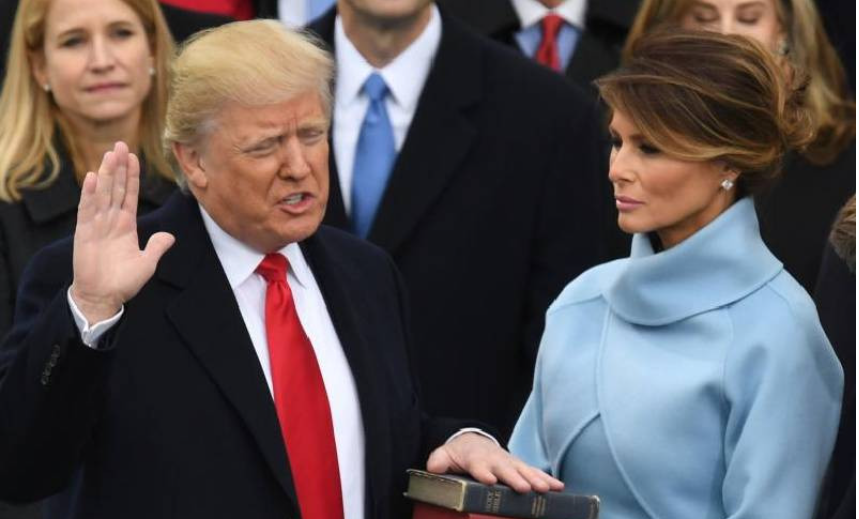 In a provocative move that has caught international attention, a Kenyan artist has unveiled a statue of former U.S. President Donald Trump in a public space in Nairobi, sparking a heated debate across the continent. The statue, which depicts Trump in a larger-than-life stance, has stirred mixed reactions, with some viewing it as a tribute to his influence, while others see it as a symbol of Africa’s complicated relationship with U.S. foreign policy under the former president.
In a provocative move that has caught international attention, a Kenyan artist has unveiled a statue of former U.S. President Donald Trump in a public space in Nairobi, sparking a heated debate across the continent. The statue, which depicts Trump in a larger-than-life stance, has stirred mixed reactions, with some viewing it as a tribute to his influence, while others see it as a symbol of Africa’s complicated relationship with U.S. foreign policy under the former president.
The unveiling of the statue comes as rumors swirl about Trump’s potential political comeback, with many speculating about his bid for the presidency in 2024. While the artist’s intentions remain unclear, the installation has ignited discussions about the legacy of Trump’s administration, particularly its impact on Africa. The “America First” policy, which Trump championed during his time in office, focused on prioritizing U.S. national interests, often at the expense of global cooperation and engagement with developing regions like Africa.
Trump’s approach to Africa was largely characterized by a lack of direct diplomatic engagement and limited investments in the continent, favoring trade and partnerships that primarily benefited U.S. businesses. His administration also pulled back from multilateral agreements, such as the Paris Climate Agreement and the Iran nuclear deal, leaving many African nations concerned about the future of U.S.-Africa relations under a Trump-led government. Trump’s rhetoric and policies often positioned America’s interests as paramount, creating a divide between U.S. priorities and the aspirations of African nations seeking greater global inclusion and partnerships based on mutual respect and development.
The statue has become a point of contention. Supporters of the monument argue that it symbolizes Trump’s global impact, including his economic policies that benefitted some African economies through initiatives like the Prosper Africa program, which aimed to boost trade and investment between the U.S. and African countries. They also point to Trump’s efforts to support the African Union and the fight against terrorism in countries like Somalia.
However, critics see the statue as a reminder of the tensions between Africa’s aspirations for global cooperation and Trump’s policies that placed American interests above those of other nations. For many Africans, Trump’s leadership was seen as a setback for the continent’s hopes of establishing a more equitable and collaborative relationship with the world’s leading superpower. Under Trump, Africa often felt sidelined, with significant foreign aid cuts and limited diplomatic initiatives compared to the engagement that other regions, such as Asia and Europe, received.
The unveiling of the statue in Nairobi has become a flashpoint for these contrasting views, as it forces African nations to confront their feelings about the U.S. under Trump and how they perceive America’s role in their future. The debate is further compounded by the fact that many Africans view the statue as a symbol of a bygone era one that does not reflect the continent’s current aspirations or its vision for the future.
The debate also highlights the broader issue of Africa’s relationship with global powers. Many African nations are striving to assert themselves on the world stage, seeking greater recognition, investment, and partnerships that prioritize their own development agendas. Africa is home to some of the world’s fastest-growing economies, and its natural resources and strategic position make it an increasingly important player in global affairs. However, the continent still faces significant challenges, including poverty, political instability, and climate change, which require cooperative, multilateral efforts to address effectively.
In light of these challenges, African leaders are calling for a shift in the global power dynamic one that favors mutual respect, long-term partnerships, and a focus on sustainable development. Many hope that future U.S. administrations will engage more proactively with Africa, offering more than just trade deals but also investments in education, healthcare, and infrastructure that can drive long-term growth.
While the statue’s unveiling has sparked a storm of controversy, it serves as a poignant reminder of the complex relationship between Africa and the United States, and the struggle for global recognition and fairness. The artist’s work, whether intended as a tribute or a critique, has ignited a broader conversation about the future of U.S.-Africa relations and what role Africa hopes to play in the next chapter of global geopolitics.
As Trump contemplates a political comeback, the question remains whether his vision for America aligns with the aspirations of Africa or if the continent will need to chart a new course in its relationships with global powers one that prioritizes the needs and dreams of its people, rather than merely the interests of powerful nations.

